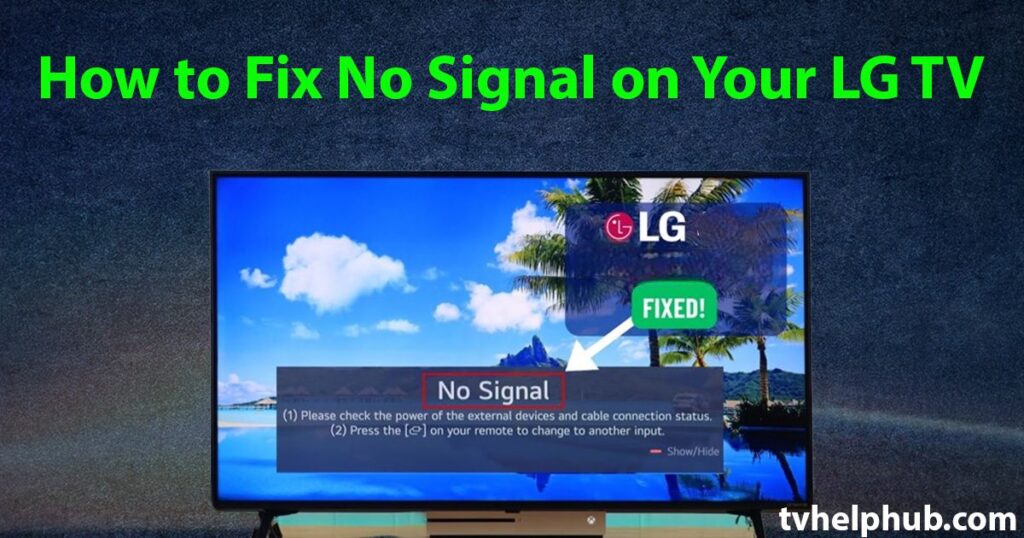Introduction
Turning on your LG TV and seeing a no signal message can definitely be frustrating, especially when you’re excited to start watching. But don’t worry there are a few simple steps to help you fix the issue. First, ensure that the TV is properly connected to any external devices like a cable box or game console. A loose HDMI or power cable is often the culprit. If your LG TV still displays the no signal error, try turning it off for a while. Sometimes, the signal just needs a break to recuperate and reconnect.
Encountering the HDMI No Signal Error
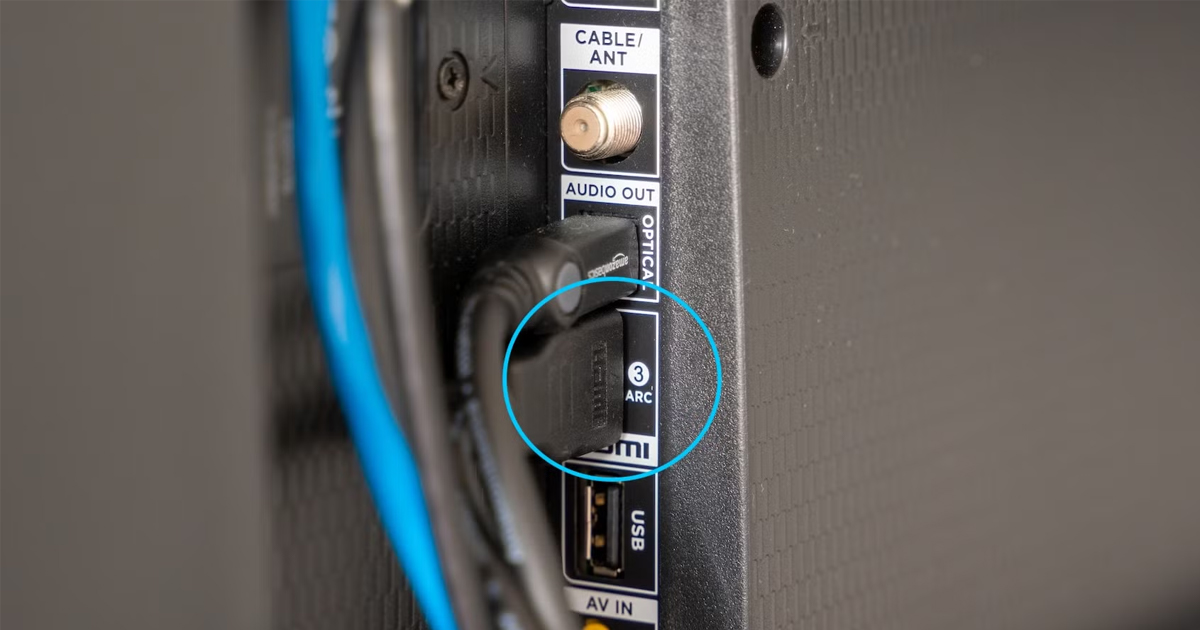 The HDMI no signal problem can also happen when there’s an issue with the HDMI port itself or the cable. If it’s not a simple connection issue, you may need to reset the TV or check if the external device is functioning correctly. Sometimes, bad weather can cause interference with your signal, especially if you’re using a satellite receiver. In cases like these, just be patient, as the issue might fix itself once the weather clears up. If all else fails, you can follow a simple troubleshooting guide to identify the exact cause and solve the no signal issue quickly.
The HDMI no signal problem can also happen when there’s an issue with the HDMI port itself or the cable. If it’s not a simple connection issue, you may need to reset the TV or check if the external device is functioning correctly. Sometimes, bad weather can cause interference with your signal, especially if you’re using a satellite receiver. In cases like these, just be patient, as the issue might fix itself once the weather clears up. If all else fails, you can follow a simple troubleshooting guide to identify the exact cause and solve the no signal issue quickly.
Common Causes of No Signal on Your LG TV
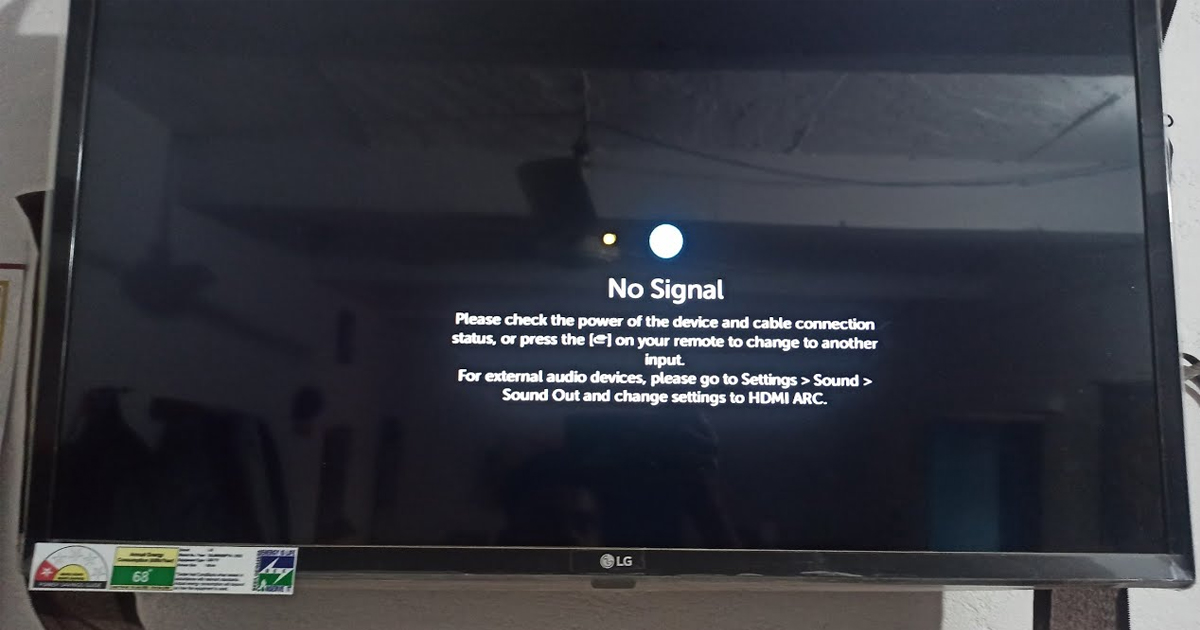 If your LG TV says no signal, the issue is often related to an unmatched input mode. For instance, if you set up a device like Roku on HDMI 1 but the TV is set to HDMI 2, it will display a no signal message. Other issues could also trigger the problem, such as external device glitches, HDCP error, or a defective motherboard. Bad weather can even interfere with the signal, especially with satellite connections. If you’re experiencing these issues, it’s best to first check if the input source is correct and ensure everything is connected properly.
If your LG TV says no signal, the issue is often related to an unmatched input mode. For instance, if you set up a device like Roku on HDMI 1 but the TV is set to HDMI 2, it will display a no signal message. Other issues could also trigger the problem, such as external device glitches, HDCP error, or a defective motherboard. Bad weather can even interfere with the signal, especially with satellite connections. If you’re experiencing these issues, it’s best to first check if the input source is correct and ensure everything is connected properly.
Troubleshooting the No Signal Issue
When you encounter a no signal message, the first step is to power off your LG TV and wait for a few minutes before restarting it. This simple action can help resolve many minor issues. If the problem persists, you’ll need to check the individual connections like the HDMI ports, cables, and any external devices. Network reception issues can also be a culprit, so ensure that all devices, including your cable box, are correctly set up and communicating with the TV. If using HDMI ports for laptop/computer connections, remember to disengage them to avoid interference unless you’re using the PC as the TV source.
External Factors and Interference
Sometimes, external factors like bad weather conditions can cause the no signal error. If you’re facing interference, waiting for the weather to clear can resolve the issue, especially if you’re using a satellite connection. In some cases, the problem is not your LG TV but rather an issue with the network reception or signal transmission. Always check that everything is securely connected, and there are no interruptions causing the signal loss.
When to Seek Professional Help
Although most no signal issues can be fixed by following simple troubleshooting steps, there may be instances when you need professional help. If the problem continues after checking the cables, HDMI ports, and input settings, it could be a more serious issue like a defective motherboard. In such cases, it’s best to consult a technician who can diagnose and repair the issue more accurately. Most often, however, following these basic steps can resolve the problem quickly and easily.
Check the Cable Connections and Input Source
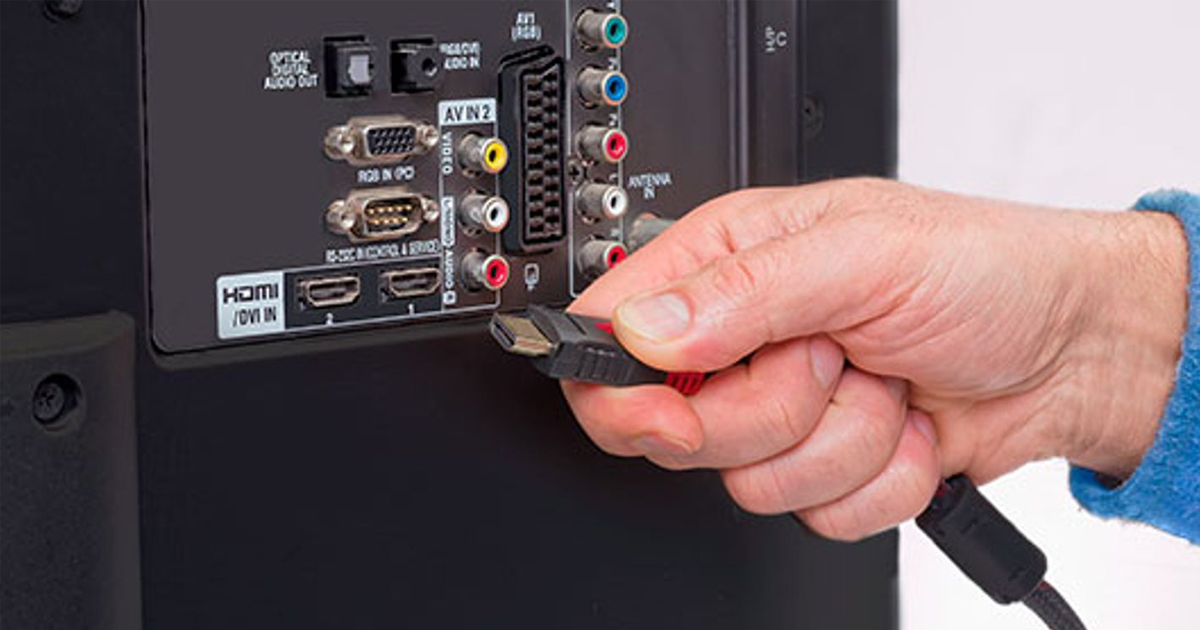 If your LG TV shows a no signal message, the first thing to do is check if the cable going into your home is properly connected. If you’re using a cable box, make sure the outside source cable connecting to one of your TV ports is not accidentally unplugged. Simply plug it back in, and your TV screen should display the picture. If you have a wall-mounted TV, check behind it to see if the source cable is disconnected from the wall outlet or power strip. If so, reinserting it properly should resolve the issue.
If your LG TV shows a no signal message, the first thing to do is check if the cable going into your home is properly connected. If you’re using a cable box, make sure the outside source cable connecting to one of your TV ports is not accidentally unplugged. Simply plug it back in, and your TV screen should display the picture. If you have a wall-mounted TV, check behind it to see if the source cable is disconnected from the wall outlet or power strip. If so, reinserting it properly should resolve the issue.
Confirm the TV Input Source
Next, you need to check the TV source using the remote. Sometimes, the input source is set to the wrong mode, like PC mode, which will cause the no signal status to appear after turning the TV on. If this is the case, change the input source to the correct one, and your LG TV should be back to normal. It’s a simple fix, but it’s easy to overlook, especially if you’ve been switching between devices like a laptop or PC.
Other Considerations
In some cases, if the above steps don’t work, there may be a deeper issue with the cable connection or an external device. If the status alert continues to display a no signal message, it might be time to examine the entire system, including checking for any PC source issues or problems with the external device. It’s also worth noting that sometimes issues with downloading apps or installing them via the official app store can cause some confusion. In such situations, sideloading apps might be a good alternative to get things working again.
Check the Cable Connection
 When you see the no signal message on your LG TV, the first thing to check is your cable connection. Ensure the cable connected to your set-top box or other devices is securely plugged into the correct HDMI port. If it’s loose or disconnected, this can cause a no signal error. Also, verify if the cable box is functioning properly, as sometimes firmware updates or settings changes can affect the connection.
When you see the no signal message on your LG TV, the first thing to check is your cable connection. Ensure the cable connected to your set-top box or other devices is securely plugged into the correct HDMI port. If it’s loose or disconnected, this can cause a no signal error. Also, verify if the cable box is functioning properly, as sometimes firmware updates or settings changes can affect the connection.
Power Cycle Your LG TV
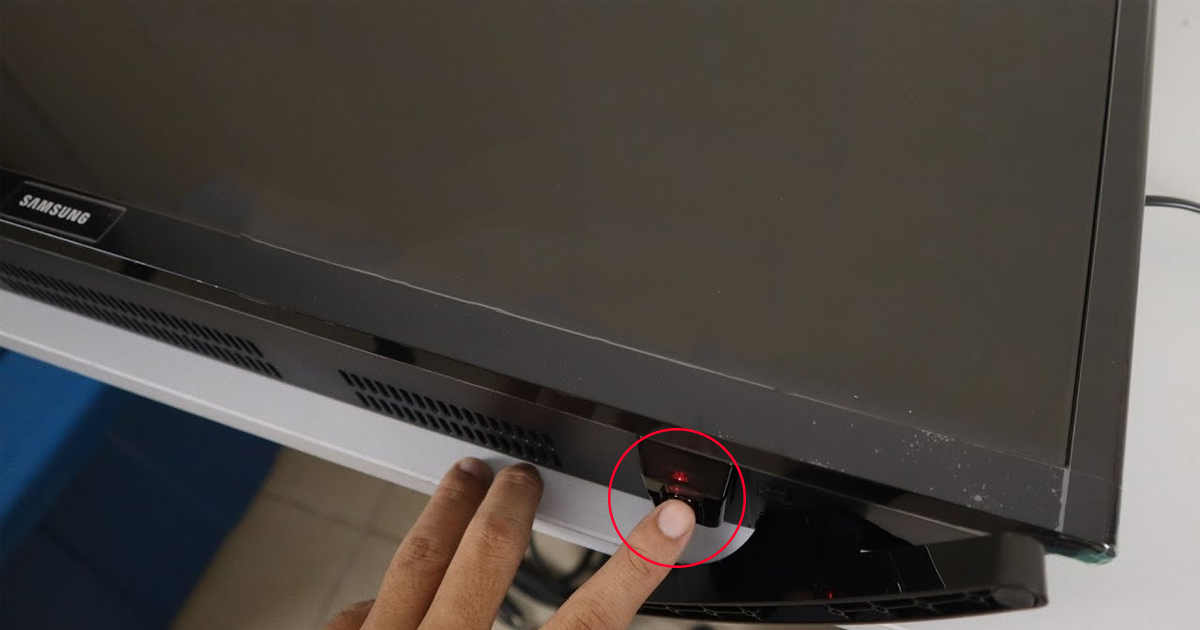 Sometimes, simply restarting your LG TV can resolve the no signal issue. To do this, unplug the TV from the power source and wait for about 2 minutes. This will allow any residual power to drain, which can help reset the system. After that, plug the TV back in and power it on. If the no signal message persists, it could be an issue with your input source.
Sometimes, simply restarting your LG TV can resolve the no signal issue. To do this, unplug the TV from the power source and wait for about 2 minutes. This will allow any residual power to drain, which can help reset the system. After that, plug the TV back in and power it on. If the no signal message persists, it could be an issue with your input source.
Troubleshoot Your Set-Top Box
A faulty or disconnected set-top box can often be the culprit behind a no signal error. If you’re using a cable box, try unplugging it and then plugging it back in. For older devices, remove the smart card or viewing card, wait for a few minutes, and then reinsert it properly. This can help clear any glitches and restore the signal. If this doesn’t work, check the HDMI connection or try using a different HDMI port
Check the HDMI Cable and Port
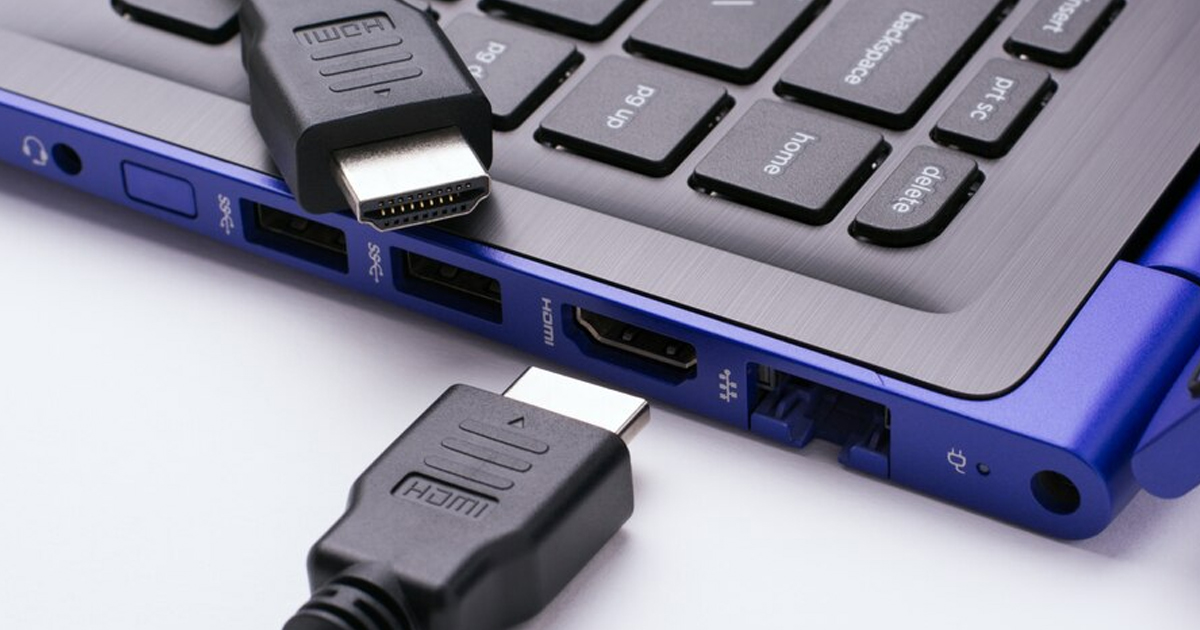 A no signal issue on your LG TV often comes from a faulty HDMI cable or port. First, unplug the HDMI cable, inspect it for any damage, and try reinserting it snugly into the same port. If the issue continues, switch to a different HDMI port or replace the cable with a self-locking HDMI connector for a more secure fit. Ensure the port is free of dust or debris by gently cleaning it with soft tools.
A no signal issue on your LG TV often comes from a faulty HDMI cable or port. First, unplug the HDMI cable, inspect it for any damage, and try reinserting it snugly into the same port. If the issue continues, switch to a different HDMI port or replace the cable with a self-locking HDMI connector for a more secure fit. Ensure the port is free of dust or debris by gently cleaning it with soft tools.
Verify Input Source Settings
Sometimes, the problem lies in selecting the wrong input source. Use your remote to navigate to the input menu and confirm the source matches the HDMI port where your device is connected. Switching to the correct source often fixes the signal issue instantly.
Seek Professional Repairs if Needed
If all connections appear fine but the no signal message persists, there may be slight damage to the ports or hardware. A TV mechanic can inspect and fix these problems. Alternatively, test with another HDMI device to rule out issues with the TV itself. Many modern LG TVs offer multiple ports, so try migrating your connection to a working one.
Check for HDCP Error on Your LG TV
 If your LG TV is showing a no signal message, the issue could be related to an HDCP error. HDCP, or High-Bandwidth Digital Content Protection, is a security feature used to prevent unauthorized copying of digital content. If you connect a non-licensed device to your LG TV, it may trigger this error, causing the no signal display. To fix this, simply remove the non-licensed device from the connection and see if the no signal issue resolves.
If your LG TV is showing a no signal message, the issue could be related to an HDCP error. HDCP, or High-Bandwidth Digital Content Protection, is a security feature used to prevent unauthorized copying of digital content. If you connect a non-licensed device to your LG TV, it may trigger this error, causing the no signal display. To fix this, simply remove the non-licensed device from the connection and see if the no signal issue resolves.
Disconnect Unused Devices to Fix No Signal
Sometimes, LG TVs may struggle to access too many inputs at once. If you have several devices connected, it might cause the no signal issue. Remove unused devices to free up the input ports. This step is especially helpful if you have multiple devices connected, like a gaming console, DVD player, or set-top box. By simplifying the connection, you may resolve the signal problem and restore the picture.
Correcting Input Source Settings
A no signal issue often happens because the TV is set to the wrong input source. Use the Input or Source button on your remote control to access available options like HDMI, TV, AV, or PC. Select the input where your device, such as a cable box or gaming console, is connected. Double-check if the connection matches, for example, HDMI 1 for the first port. Restarting your LG TV after making these adjustments can also help resolve the problem.
Adjusting Input Channels
If your TV still shows no signal, it may need to be on a different base channel. For older devices, try switching the TV to channel 3 or 4 using the remote. You can also reverse the order of turning on the TV and cable box to re-establish the signal. Sometimes, the way devices connect can impact their performance, so giving them a chance to reset together can solve the issue.
If you’re facing a no signal issue when connecting your PC to your LG TV, the problem may be with the settings on your PC. To fix this, press Win + P on your keyboard and choose either Extend, Duplicate, or Second Screen Only. One of these options should send the correct signal to the TV. If your PC is set to PC screen only, your TV won’t receive the signal, causing the no signal message. Also, navigate to Settings > System > Display, and ensure that Multiple Displays is enabled. You can try clicking Detect to ensure the PC detects the TV properly.
Check HDMI Port Connections
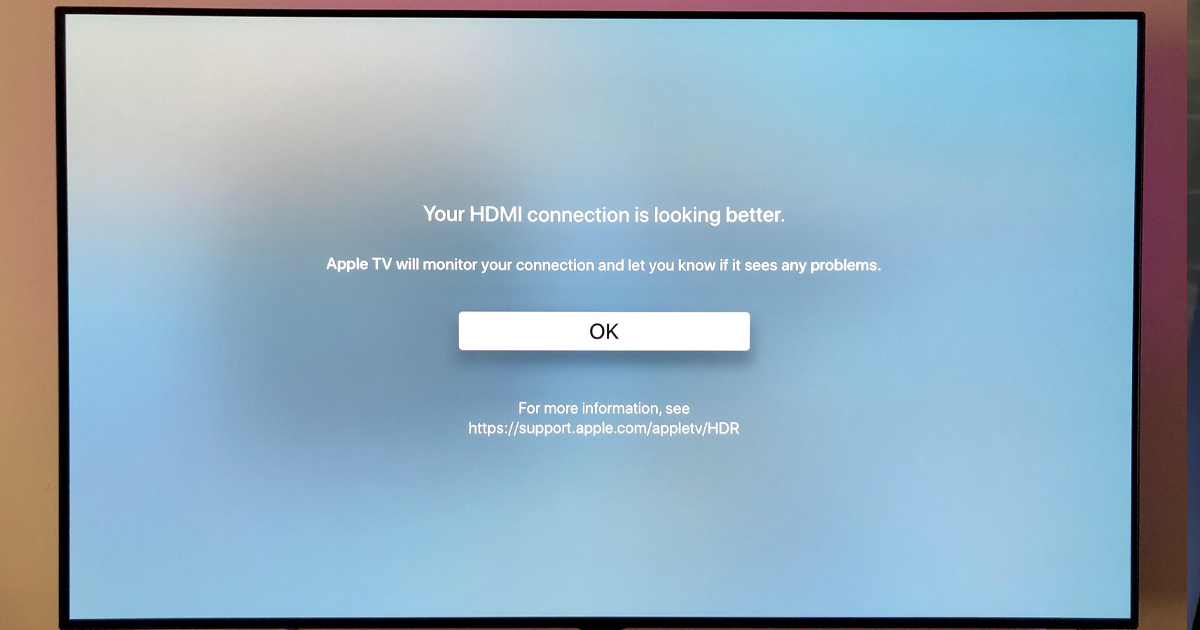 Another common cause of no signal issues with LG TV is the HDMI connection. Ensure that the HDMI cable is connected securely to both your PC and the TV. If you’re using a GPU, check that the HDMI cable is plugged into the correct port, as the HDMI port on the motherboard is often disabled when a GPU is used. If you’re connecting wirelessly, click on Connect to find your TV in the list of available displays. Once these adjustments are made, the no signal issue should be resolved.
Another common cause of no signal issues with LG TV is the HDMI connection. Ensure that the HDMI cable is connected securely to both your PC and the TV. If you’re using a GPU, check that the HDMI cable is plugged into the correct port, as the HDMI port on the motherboard is often disabled when a GPU is used. If you’re connecting wirelessly, click on Connect to find your TV in the list of available displays. Once these adjustments are made, the no signal issue should be resolved.
